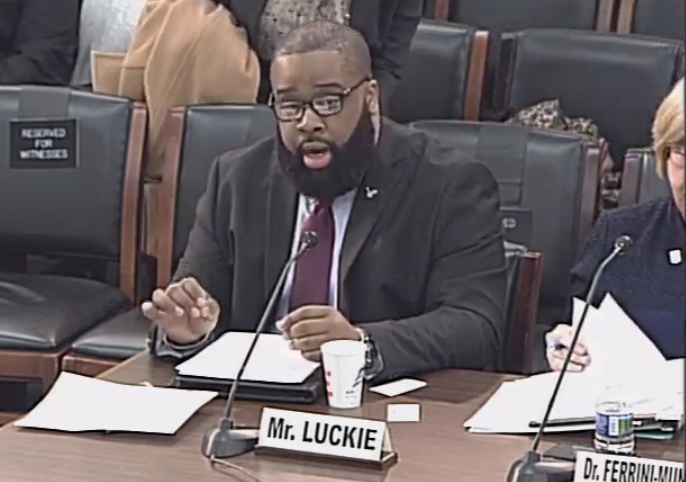Ex-Edge Exec: Consumer Tech Reflects Lack Staff of Diversity

The smarter way to stay on top of broadcasting and cable industry. Sign up below
You are now subscribed
Your newsletter sign-up was successful
Another day, another tech smackdown on the Hill.
The House Consumer Protection Subcommittee waded into the issue of the lack of diversity in the tech sector and its impact not only on staffing but the tech those mostly male, white or Asian, engineers produce.
Committee chair Rep. Jan Schakowsky (D-Ill.) emphasized the potential for a workforce lacking in diversity to translate into bias or blind spots in the algorithms that lead to discriminatory results in determining who gets jobs, who gets sold what at what price, who is targeted with advertising, or excluded, and much more.
She said that unfair business practices and extreme market concentration in tech may perpetuate bias "and the old, actually young, boys club."
Related: FTC Targets Big Tech for Closer Scrutiny
Ranking member Cathy McMorris Rogers (R-Ore.) talked more about the need to recruit and retain diverse employees, and suggested tech companies needed to improve, but were already getting the message and even leading in some cases. She pointed to a software testing company that had hired people with autism because their attention to detail and skills in finding patterns were important to software quality assurance. She said she was looking forward to hear how tech was "leading" on this, a definite departure in town from the Democrats.
"While the United States has become more and more diverse, the workforce of the technology sector has not kept up. And we are seeing the effects of that in the products and services we use—like wearable fitness trackers that don’t work for people with dark skin, online job advertisements targeted at men over women, and websites with buttons and links too small for people with motor impairments to use," said House Energy & Commerce Committee chair Frank Pallone (D-N.J.). "Without inclusive workforces, too often product design leaves people out. The result can be embarrassing for the company when discovered and harmful for society when a discriminatory result is not identified and fixed."
The smarter way to stay on top of broadcasting and cable industry. Sign up below
Arguably the most compelling testimony came from Mark Luckie, whose resume suggests he knows what is going on, and why. Luckie, himself African American, is former manager of global influencers at Facebook, former head of media for Reddit, and former manager of journalism and news at Twitter.
He is also the former exec who, while at Facebook, published an internal memo outlining how he had told the company it was failing both black users and employees. Luckie says he has gotten hundreds of emails since from people in tech and other industries who had similar discrimination issues.
"The tech industry continues to be populated by mostly white or Asian men," Luckie said. "Diversity is an integral part of the fabric of America and yet it is not reflected in the companies that affect the lives of millions of this country’s citizens. Underrepresented groups find themselves shut out of the development of products they use every day."
He said he has seen it firsthand, and it is still going on.
But beyond staffing inequities, Luckie said, is "inequalities in consumer technology that the deficiency is creating." He conceded many such biases were unintentional and later corrected, but also suggested they were systematic and associated with "overreliance on algorithms, teams without diverse voices, or lack of input from communities of color."
He pointed out tech companies often cite the "pipeline" problem--that there are not that many women and minorities graduating with computer science degrees. Luckie concedes most of those are white men, but says that fewer women and minorities with such degrees are being hired than could be.
He said STEM education could help, but also said that does not account for the under-representation in non-engineering jobs at those companies.
Related: Hill Hammers Facebook over Openness of Closed Groups
Luckie also came with some anecdotal examples of tech bias, from the "smart" soap dispenser that has trouble identifying hands with dark skin and the early iterations of the Google Photos app that automatically labeled images of African Americans as gorillas, to the Facebook ad platform that "allowed its advertisers to target housing ads based on race and specifically exclude certain races from seeing housing ads, which is a federal crime."
Rep. Kathy Castor (D-Fla.) talked about anecdotal examples illustrating a "larger pattern" in tech of "discriminatory processes and products."
Edge providers and other tech companies have been on the hot seat in Washington over everything from fake news, hate speech, and data sharing, to breaches and charges of bias against conservatives, as well as a historic lack of diversity in Silicon Valley.
Contributing editor John Eggerton has been an editor and/or writer on media regulation, legislation and policy for over four decades, including covering the FCC, FTC, Congress, the major media trade associations, and the federal courts. In addition to Multichannel News and Broadcasting + Cable, his work has appeared in Radio World, TV Technology, TV Fax, This Week in Consumer Electronics, Variety and the Encyclopedia Britannica.

